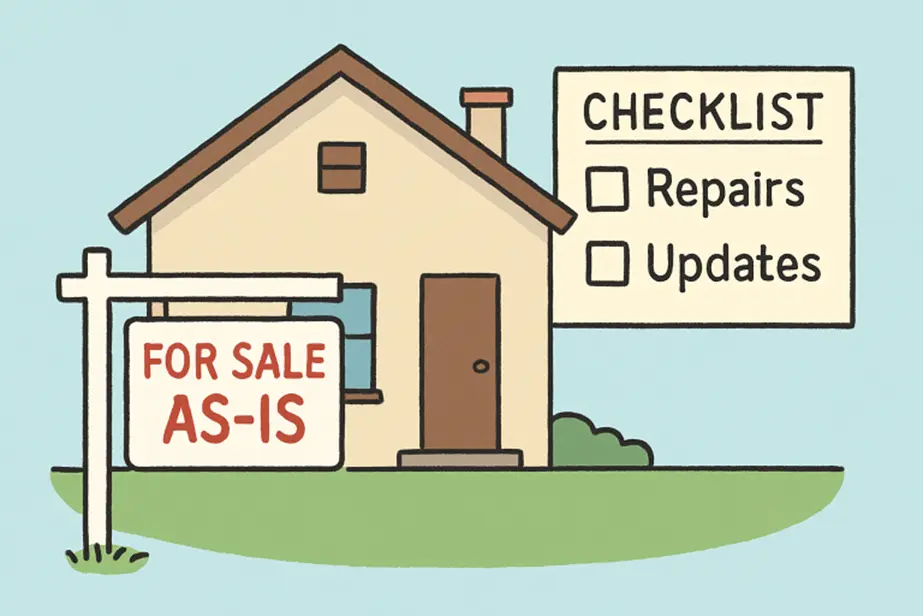What Does It Mean to Sell a Home “As-Is”?
In real estate, selling a property “as-is” means offering it in its current condition, without making any repairs or improvements before the sale. The seller discloses that no additional investments will be made, placing the responsibility for repairs on the buyer. While many assume “as-is” sales are only for homes in serious disrepair, they’re also a practical choice for inherited properties, homes needing cosmetic updates, or those facing time-sensitive moves.
A common option for these types of sales is working with a local investor, who can often provide cash offers and flexible timelines. This allows homeowners to bypass the traditional listing process, avoid repairs, and sell more quickly.
There are many misconceptions about “as-is” sales. Some believe only dilapidated homes qualify, but many owner-occupied residences, rental properties, and even newer homes with minor issues are sold this way. Rather than investing time and money into uncertain renovations, homeowners can streamline the selling process.
The True Cost of Home Repairs Before Selling
Homeowners are often surprised by the substantial expenses of preparing a property for sale. According to the National Association of Realtors, common pre-sale repairs include roof replacement (averaging $7,500–$10,000), plumbing or electrical upgrades ($3,000–$5,000), and foundation repairs (which can exceed $8,000). These aren’t just minor fixes—they’re critical systems that buyers expect to be in working order. Beyond repairs, staging, landscaping, and deep cleaning add further costs, increasing the financial burden for sellers hoping to impress discerning buyers.
Sellers with older or distressed homes have an extra incentive to consider this path, since extensive renovations may be unaffordable and unnecessary to attract a specialized buyer pool.
Case Study: Selling Without Renovations
Consider a homeowner who inherited a dated property in an older neighborhood. Rather than invest tens of thousands to modernize the kitchen and bathrooms, they listed the home as-is, attracting investors seeking a project. The sale closed in just three weeks—far sooner than the regional average when pre-sale updates are involved.
Financial Benefits of Skipping Pre-Sale Updates
For many homeowners, the biggest advantage of selling “as-is” is financial. By avoiding costly repairs, staging, and deep cleaning, sellers can present their homes to cash-ready buyers or investors without extensive out-of-pocket investment. Traditional sales often incur up to 6% realtor commission, not to mention closing fees and holding costs. In contrast, as-is sales—particularly those to cash buyers—can eliminate much of this expense.
The Buyer’s Perspective: Why “As-Is” Appeals to Certain Buyers
As-is homes primarily attract cash buyers and investors looking to renovate and resell (or rent) the property. These buyers are experienced in handling repairs, ensuring a quicker path to closing. Owner-occupants seeking a fixer-upper may also find as-is listings appealing, especially in competitive markets with limited move-in-ready inventory.
Notably, demand among these buyers influences both the speed and ease of the sale. The certainty of a cash or investor offer can reassure sellers facing foreclosure, job relocation, or inheriting an unwanted property, helping avoid long waits and further expense.
Expert Tips for a Smooth As-Is Sale
- Set a fair asking price: Price competitively, considering repairs that buyers must take on. Reference similar recent as-is sales in your neighborhood.
- Work with experienced professionals: Partner with agents, attorneys, or investors who are well-versed in as-is sales. Their insight can help avoid costly errors.
- Communicate clearly with buyers: Provide all necessary disclosures and answer questions honestly. Clear communication can prevent most misunderstandings and keep transactions on track.
Conclusion
Selling a home “as-is” can be a smart, practical strategy for many homeowners—especially those with inherited properties, time-sensitive relocations, or limited repair resources. By working with the right professionals or a trusted local investor, sellers can simplify the process, reduce expenses, and secure a quicker closing. With realistic pricing, clear communication, and proper guidance, an as-is sale can be both efficient and financially beneficial.
Also Read–Affordable Waste Solutions for Businesses in Spartanburg










